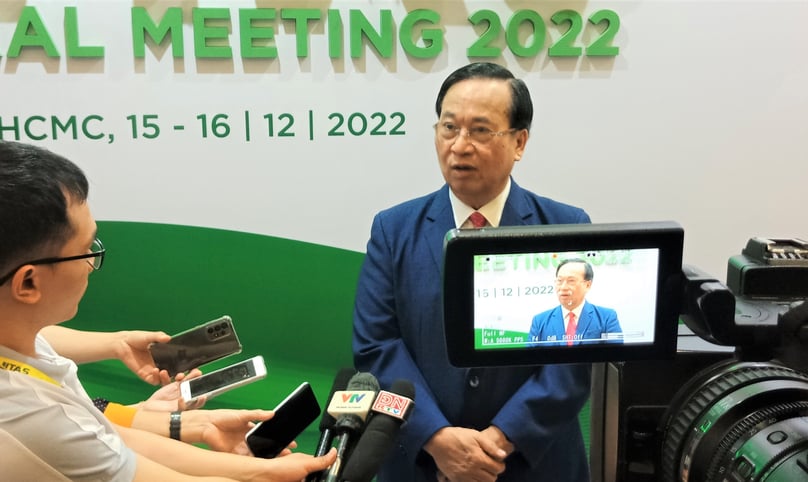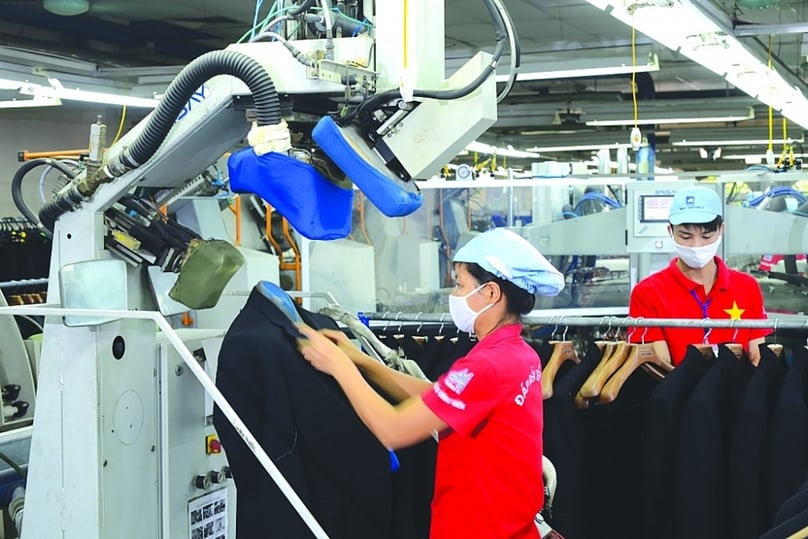Going green is a must for the whole industry as global markets and brands require more and more green products, Vietnam Textile and Apparel Association (VITAS) chairman Vu Duc Giang told reporters at the VITAS General Meeting 2022 on Friday.

Vietnam Textile and Apparel Association chairman Vu Duc Giang talks to Vietnamese media at VITAS General Meeting 2022 on December 16, 2022 in Ho Chi Minh City. Photo by The Investor/Tuong Thuy.
For example, the European Commission had earlier this year passed its strategy for sustainable and circular textiles. Therefore, Vietnamese exporters must raise the sustainability of their products for export to the EU.
The sector’s going green includes building green factories, using more eco-friendly materials, reducing the environmental impact, using renewable energy, reducing energy and water consumption, and others.
The most popular way in utilizing renewable energy is to use rooftop solar power from their own factories. Other greening initiatives include replacing electric boilers and reusing wastewater.
The green-going measures require both governmental support and companies’ actively investing in upgrading machinery and technology.

At the meeting in Ho Chi Minh City, VITAS General Secretary Truong Van Cam highlighted the association’s PPP (Profit-People-Planet) formula as a well-suited model for its member to go green. Under the model, producers are advised to pursue profits in parallel with improving workers' living conditions and embracing green production to make the world greener.
Vietnam earned around $44 billion from textile and garment exports in the entire 2022, up 8.8% from last year, said VITAS chairman Giang. The exported products are shipped to 66 countries and territories worldwide.
For 2023, the association expects the value to be $47-48 billion in a positive scenario, and $45-46 billion in a less positive scenario.
The industry’s export value is expected to increase by 5-6% annually until 2030, and 2-3% between 2031 and 2035, according to the country’s draft development strategy for the sector until 2035. The strategy is waiting for governmental approval. The industry looks to achieve circularity between 2031 to 2035, according to the draft strategy.
Economist Can Van Luc told the VITAS General Meeting that the sector needs to promote green, green consumption, and circular business activities as soon as possible. Besides, digital transition is another measure to help Vietnam catch up with global trends.
In a related development, the ASEAN Federation of Textile Industries (AFTEX) held its 48th council meeting and the 46th plenary session on Thursday as part of the VITAS conference program.
VITAS chairman Giang, also AFTEX President for the 2021-2022 tenure, said facing intertwined opportunities and challenges in the global market, companies of AFTEX member countries should continue building information channels to connect with one another more strongly and provide mutual assistance to tap into the strengths of each country.
In the time to come, the member countries need to join hands to form fiber, weaving, dyeing, and sewing connectivity chains and share experience among their businesses, therefore helping them develop sustainably and adopt green production and practices, he said.
He also handed over the rotating AFTEX presidency for 2023 - 2024 to Tan Kim Teck Albert, chairman of Cambodia’s Textile, Apparel, Footwear, and Travel Goods Association.
Source: The investor






























